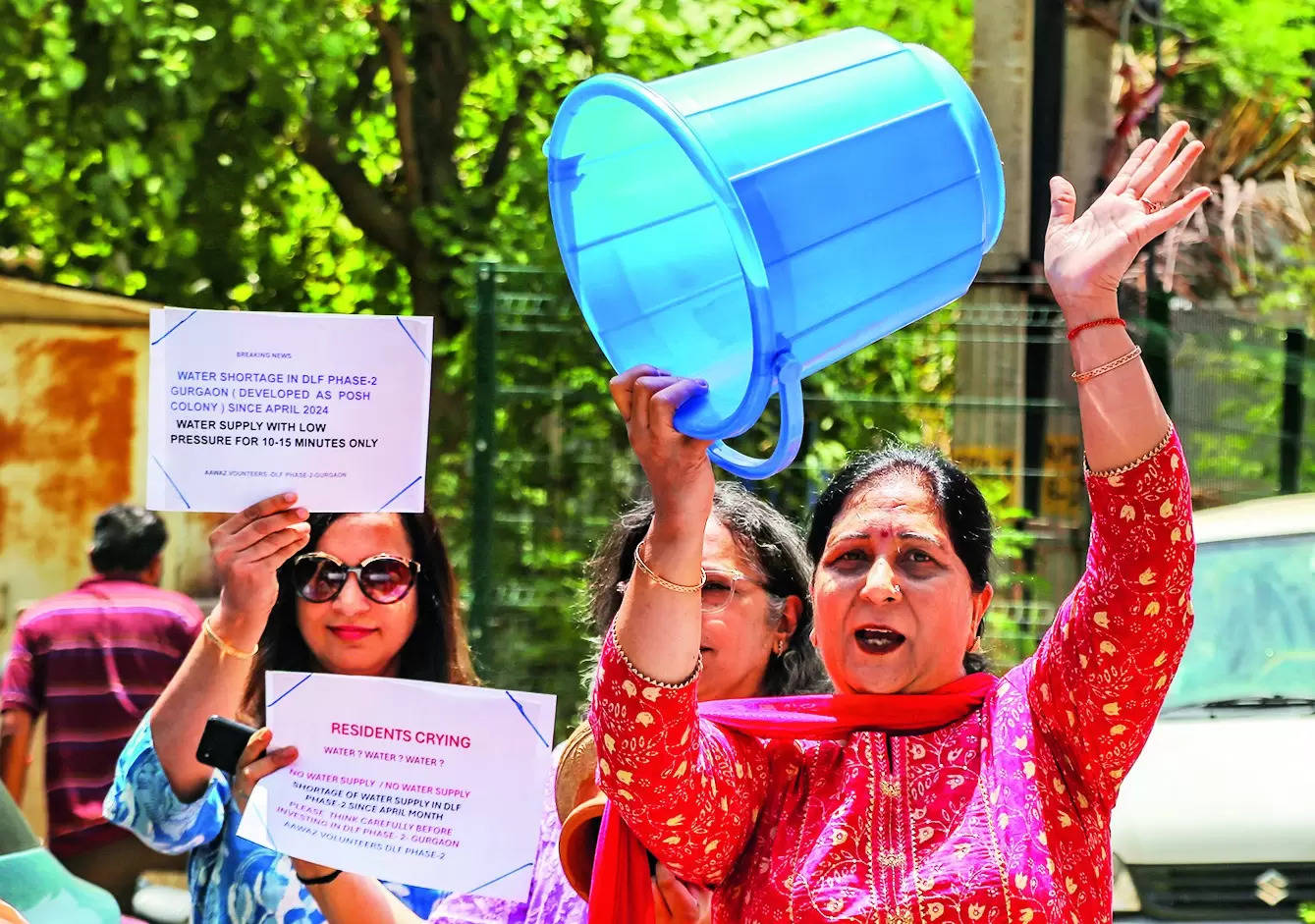
GURUGRAM: DLF-2 residents staged a protest against the authorities over the ongoing water crisis in front of the boosting station in the upscale colony’s P block on Tuesday.
Holding posters, empty buckets, and earthen pots in the scorching heat, the protesters said their colony has been facing a severe water crisis since April, forcing them to hit the streets. Some residents have even put up “please buy floors at your own risk” signboards on their properties.
In some blocks, including M, N and J, households haven’t received any water at all for a month now, residents said. Those who are getting supply said it lasts for only 10-15 minutes and even then, the pressure is so low that water merely trickles from taps. Frequent power outages are adding to their woes.
“The water supply infrastructure is old and hasn’t been upgraded to meet the needs of the increasing population, especially after the floor area ratio was increased,” said RN Srivastava, a resident who was among those protesting on Tuesday.
Madhu Madhwani, another resident, said: “We haven’t got even a single drop of water in the past one month. We are spending exorbitant amounts of money on private tankers.”
A resident who has put up a cautionary signboard on his property said he is fed up with the water shortage and frequent power cuts. “I don’t want any other homebuyer to face such problems after investing large amounts of money to buy a builder floor here. This is my way of protesting against the current situation,” he said.
“We are paying both high maintenance charges to the developer and property tax to MCG but are still denied basic amenities,” said Lakshmi Gupta, a resident.
Residents also alleged misuse of potable water by construction sites. The absence of effective measures to curb water wastage and misuse has exacerbated the existing shortage, they said.
“Multiple complaints to GMDA and the developer have resulted in no relief, with both parties passing the buck. While we struggle for water, construction sites have a steady flow of water,” said Aurobindo Verma, who has been living in DLF-2 for nearly 30 years.
“We have requested the developer to activate rainwater harvesting systems to compensate for the loss of groundwater, but our suggestions have fallen on deaf ears,” said Ishwar Kewalramani from Aawaz Volunteers, a citizens’ group.
Acknowledging the disparity between supply and demand, GMDA officials said they had earlier asked the developer to install borewells as a stop-gap arrangement, but nothing was done.
“We have increased supply in DLF phases 1 to 4 from 20 MLD to 25 MLD. Due to erratic power supply and reduced raw water supply at the WTPs, operations were affected earlier. But this has been resolved. We are supplying water at the optimum capacity now,” a senior official said.
A representative of the developer said there is a shortage in supply from GMDA’s end. “Our area is at the tail end of the water network and can’t be adequately covered with the current supply. The authorities concerned are taking steps to augment supply,” said Nitya Mohan, head of facility management, DLF City.
Meanwhile, Delhi found itself grappling with a dual crisis on Tuesday: an acute power shortage coinciding with a soaring mercury level. The outage, which began at around 2pm, was triggered by a fire at a power grid in UP’s Mandola, which supplies 1,500MW to the capital. The duration of the power cuts varied across different areas, with some experiencing blackouts lasting up to an hour, while others were without power for two to three hours.
The power disruptions, combined with daytime temperatures exceeding 43 degrees Celsius in several parts of the city, created a challenging situation for people in ITO, Laxmi Nagar, Lajpat Nagar, Jamia, Narela, Model Town, Rohini, Kashmere Gate, Civil Lines, Mukherjee Nagar, Jahangirpuri, Sarita Vihar and Sukhdev Vihar.